Related Research Articles
Amaziah or Amasias may refer to:
Amoz, also known as Amotz, was the father of the prophet Isaiah, mentioned in Isaiah 1:1; 2:1 and 13:1, and in II Kings 19:2, 20; 20:1. The word "amoz" means strong
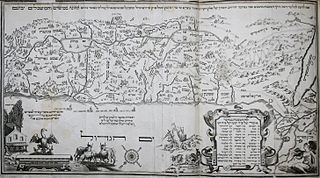
According to the Hebrew Bible, the Tribe of Ephraim was one of the tribes of Israel. The Tribe of Manasseh together with Ephraim formed the House of Joseph. It is one of the ten lost tribes. The etymology of the name is disputed.

Sela is a geographical name encountered several times in the Hebrew Bible, and applicable to a variety of locations.
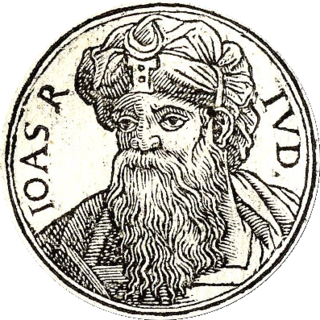
Jehoash, also known as Joash, Joas or Joás, was the eighth king of Judah, and the sole surviving son of Ahaziah after the massacre of the royal family ordered by his grandmother, Athaliah. His mother was Zibiah of Beersheba. Jehoash was 7 years old when his reign began, and he reigned for 40 years. He was succeeded by his son, Amaziah of Judah. He is said to have been righteous "all the days of Jehoiada the priest" but to have deviated from fidelity to Yahweh after Jehoiada's death.
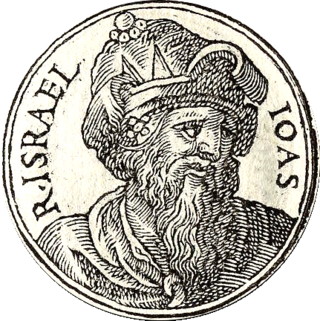
Jehoash, whose name means "Yahweh has given," was the twelfth king of the ancient northern Kingdom of Israel (Samaria) and the son of Jehoahaz. He was the 12th king of Israel and reigned for 16 years. William F. Albright has dated his reign to 801–786 BC, while E. R. Thiele offers the dates 798–782 BC. When he ascended the throne, the Kingdom of Israel was suffering from the predations of the Arameans, whose king Hazael was conquering land controlled by Israel.
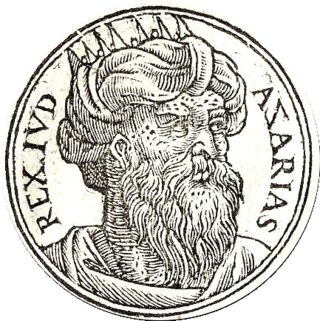
Uzziah, also known as Azariah, was the tenth king of the ancient Kingdom of Judah, and one of Amaziah's sons. Uzziah was 16 when he became king of Judah and reigned for 52 years. The first 24 years of his reign were as a co-regent with his father, Amaziah.
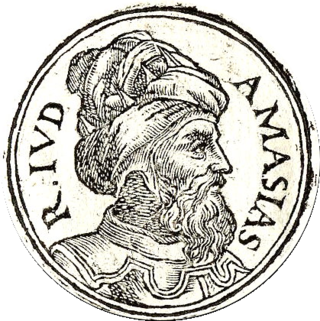
Amaziah of Judah, was the ninth king of Judah and the son and successor of Joash. His mother was Jehoaddan and his son was Uzziah. He took the throne at the age of 25, after the assassination of his father, and reigned for 29 years,, 24 years of which were with the co-regency of his son. The second Book of Kings and the second Book of Chronicles in the Hebrew Bible consider him a righteous king, but with some hesitation. He is praised for killing the assassins of his father only and sparing their children, as dictated by the Mosaic Law.

Man of God is a biblical title of respect applied to prophets and beloved religious leaders. The term appears 78 times in 72 verses of the Bible, in application to up to 13 individuals:
Iddo was a biblical prophet. According to the Books of Chronicles, he lived during the reigns of King Solomon and his heirs, Rehoboam and Abijah, in the Kingdom of Judah.
The Book of the Kings of Judah and Israel was separated into the two books of I Kings and II Kings in the Old Testament. The book is described at 2 Chronicles 16:11. The passage reads: "And, behold, the acts of Asa, first and last, lo, they are written in the book of the kings of Judah and Israel." It is also referenced at 2 Chronicles 24:27; "The account of his sons, the many prophecies about him, and the record of the restoration of the temple of God are written in the annotations on the book of the kings. And Amaziah his son succeeded him as king."

Jeremiah 34 is the thirty-fourth chapter of the Book of Jeremiah in the Hebrew Bible or the Old Testament of the Christian Bible. It is numbered as Jeremiah 41 in the Septuagint. This book contains prophecies attributed to the prophet Jeremiah, and is one of the Books of the Prophets. This chapter anticipates the final moments in the assault of the Babylonian army against Jerusalem, when Jeremiah foretold the destruction of the city and the captivity of King Zedekiah, and sharply criticized the treacherous dealings of the princes and people with the slaves that provoked the punishment from God.

2 Kings 14 is the fourteenth chapter of the second part of the Books of Kings in the Hebrew Bible or the Second Book of Kings in the Old Testament of the Christian Bible. The book is a compilation of various annals recording the acts of the kings of Israel and Judah by a Deuteronomic compiler in the seventh century BCE, with a supplement added in the sixth century BCE. This chapter records the events during the reigns of Amaziah the son of Joash, king of Judah, as well as of Joash, and his son, Jeroboam (II) in the kingdom of Israel. The narrative is a part of a major section 2 Kings 9:1–15:12 covering the period of Jehu's dynasty.

2 Chronicles 24 is the twenty-fourth chapter of the Second Book of Chronicles the Old Testament in the Christian Bible or of the second part of the Books of Chronicles in the Hebrew Bible. The book is compiled from older sources by an unknown person or group, designated by modern scholars as "the Chronicler", and had the final shape established in late fifth or fourth century BCE. This chapter belongs to the section focusing on the kingdom of Judah until its destruction by the Babylonians under Nebuchadnezzar and the beginning of restoration under Cyrus the Great of Persia. The focus of this chapter is the reign of Joash, king of Judah.

2 Chronicles 25 is the twenty-fifth chapter of the Second Book of Chronicles the Old Testament in the Christian Bible or of the second part of the Books of Chronicles in the Hebrew Bible. The book is compiled from older sources by an unknown person or group, designated by modern scholars as "the Chronicler", and had the final shape established in late fifth or fourth century BCE. This chapter belongs to the section focusing on the kingdom of Judah until its destruction by the Babylonians under Nebuchadnezzar and the beginning of restoration under Cyrus the Great of Persia. The focus of this chapter is the reign of Amaziah, king of Judah.

1 Chronicles 5 is the fifth chapter of the Books of Chronicles in the Hebrew Bible or the First Book of Chronicles in the Old Testament of the Christian Bible. The book is compiled from older sources by an unknown person or group, designated by modern scholars as "the Chronicler", and had the final shape established in late fifth or fourth century BCE. This chapter focuses on the Transjordanian tribes, geographically from south to north: Reuben, Gad and the half tribe of Manasseh, as well as the account of the war against the Hagrites and the reasoning why Transjordanian tribes were taken away into exile. It belongs to the section focusing on the list of genealogies from Adam to the lists of the people returning from exile in Babylon.

1 Chronicles 13 is the thirteenth chapter of the Books of Chronicles in the Hebrew Bible or the First Book of Chronicles in the Old Testament of the Christian Bible. The book is compiled from older sources by an unknown person or group, designated by modern scholars as "the Chronicler", and had the final shape established in late fifth or fourth century BCE. This chapter contains the account of an unsuccessful attempt to bring the ark of the covenant to Jerusalem by David. The whole chapter belongs to the section focusing on the kingship of David.

2 Chronicles 26 is the twenty-sixth chapter of the Second Book of Chronicles the Old Testament in the Christian Bible or of the second part of the Books of Chronicles in the Hebrew Bible. The book is compiled from older sources by an unknown person or group, designated by modern scholars as "the Chronicler", and had the final shape established in late fifth or fourth century BCE. This chapter belongs to the section focusing on the kingdom of Judah until its destruction by the Babylonians under Nebuchadnezzar and the beginning of restoration under Cyrus the Great of Persia. The focus of this chapter is the reign of Uzziah, king of Judah.
War in the Hebrew Bible concerns any military engagement narrated or discussed in the Hebrew Bible, also known as the Tanakh or Old Testament of the Bible. Texts about war in the Hebrew Bible are part of the broader topic of The Bible and violence. They cover a wide range of topics from detailed battle reports including weapons and tactics used, numbers of combatants involved, and casualties experienced, to discussions of motives and justifications for war, the sacred and secular aspects of war, descriptions and considerations of what in modern times would be considered war crimes such as genocide or wartime sexual violence, and reflections on wars that have happened, or predictions, visions or imaginations of wars that are yet to come.
References
- 1 2 3 4 http://biblehub.com/topical/j/joktheel.htm Biblehub